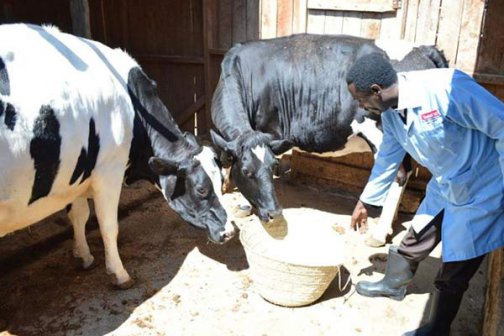Making Money Dairy Farming: Silas Mwirigi is a professional dairy farmer who is milking millions of shillings from his thriving 15-acre farm-cum-home at Ndaiga location, Laikipia East, just metres away from the Meru-Laikipia counties border. Dr Mwirigi, who is the Principal of Meru School, currently milks 700 litres from his 25 lactating cows, and attributes his success to proper feeding, treating and nurturing his cows.
He has 52 cows, but only 25 are being milked at the moment. He says taking care of his workers’ needs has motivated them and they put their all in the farm. Gemine, a Friesian, produces 45 litres every day, and so does Humprey. Rose, Max and Mercy, each produce 38 litres when pregnant. He sells milk at Sh 40 per litre to Meru Dairy Union the 700 litres gives him Sh28,000 daily.
“With 15 other large-scale dairy farmers, we have started our own dairy mill, Meslopes, where we get feeds enriched with vitamins and minerals for our cows.
Maggie Ireri: What I learnt after taking a loan to buy a house in my 30s
“Feeds are very expensive and previously ate into our profits, so we got together and started our own mill at Kaaga in Meru County,” says Mwirigi. He has dedicated a five-acre parcel for production of silage for his cows and this has saved him the cost of feeds.
“I grow nappier grass, legumes, maize and other supplements for my cows. Giving cows enough quality food has been key to success. “I have enough hay, which I have to store in dry areas to prevent loss of nutrients,” he tells Smart Harvest at his farm, just metres away from the Meru-Nanyuki highway.
Currently, Mwirigi has buried 230 tonnes of silage in the five-acre farm, enough stock to feed his cows for a whole year.
The underground silage store is three feet deep and 30 metres long. He gets bran from wheat and maize in the farm, which he feeds to the cows that are not lactating. “I have put a layer of plastic on top of the soil to prevent the soil from contaminating the feeds. It also ensures air and water does not penetrate into silage,” he says. To ensure the farm has a reliable source of water, Mwirigi sunk a Sh2 million borehole. He sells some water to Sirimon, a dairy products manufacturer located near his farm.
The fake Kenyan doctor who conducted 8 ‘successful surgeries’
“I also sell some of the milk to my neighbours and the dairy unions come for the milk too. Currently, Mwirigi has buried 230 tonnes of silage in the five-acre farm, enough stock to feed his cows for a whole year.
The underground silage store is three feet deep and 30 metres long. He gets bran from wheat and maize in the farm, which he feeds to the cows that are not lactating. “I have put a layer of plastic on top of the soil to prevent the soil from contaminating the feeds. It also ensures air and water does not penetrate into silage,” he says. To ensure the farm has a reliable source of water, Mwirigi sunk a Sh2 million borehole. He sells some water to Sirimon, a dairy products manufacturer located near his farm.
“I also sell some of the milk to my neighbours and the dairy unions come for the milk too. “I realised it was wise not to put all my eggs in one basket, hence the reason to sell to two unions!” says Mwiringi, who is also chairman of the county’s Kenya Secondary School Heads Association (Kessa). Mwirigi says he started with only three cows of Friesian and Ayshire species in 2012. They get doses for Artificial Insemination from Germany and Netherlands. “Making sure that all the cows are in good health is key to optimum production of milk.
“I have a vet who comes to check on the animals twice a week, and any other time they need his attention,” he says.
He adds that his wife, Phylis, a businesswoman, and their three workers have been motivated to take good care of the cows. The workers are from Kisii, Mt Elgon and Kitale. “I deliberately employed people from far because the attention of the locals would divide between the farm and their homes. I give them a 14-day leave in a year so they can visit their families,” Mwirigi says. “I pay them well to keep them motivated, and help them to save. I want to see them have dairy projects in their homes and that is why I don’t hesitate to give them heifers.”
He says he is passionate about dairy farming and loves his animals and their returns. “Now my plan is to start a dairy shop because I am on the highway. I want to add my stock and start processing yoghurt, milk and other dairy products to sell to locals and travellers,” says the father four. Making Money Dairy Farming. Making Money Dairy Farming.
This feature was first published in The Standard.









